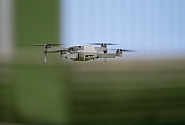
Under new legislation adopted by the Saeima on Thursday, 27 March, police will be authorised to land or neutralise drones not only in the event of an actual attack, but also to prevent potential threats. Until now, such action was only permitted during an ongoing drone assault.
As the use of drones continues to grow, an effective response is needed to address unlawful use and mitigate possible risks. Members of the Saeima Defence Committee, responsible for the draft law, have previously highlighted the importance of strengthening preventative measures.
The amendments grant the police the right to use special equipment to stop the movement of remotely operated devices—whether in the air, on water, or on land—if such devices pose a threat to public safety, human life or health, protected facilities, or critical infrastructure. These measures may be taken in cases of unlawful use or when there are reasonable grounds to suspect a potential criminal offence.
According to police representatives, the changes will also allow special police units to act in situations where drones are suspected of being used for criminal purposes. Previously, only border guards and armed forces personnel were authorised to land or neutralise drones in response to a potential threat.
Although the State Police have long had the technical means to detect unmanned aerial vehicles—their flight paths, altitude, and the location of the remote operator—they lacked the legal authority to intercept, destroy, or forcibly land them, even in cases where public safety or critical infrastructure was at risk.
Saeima Press Service







